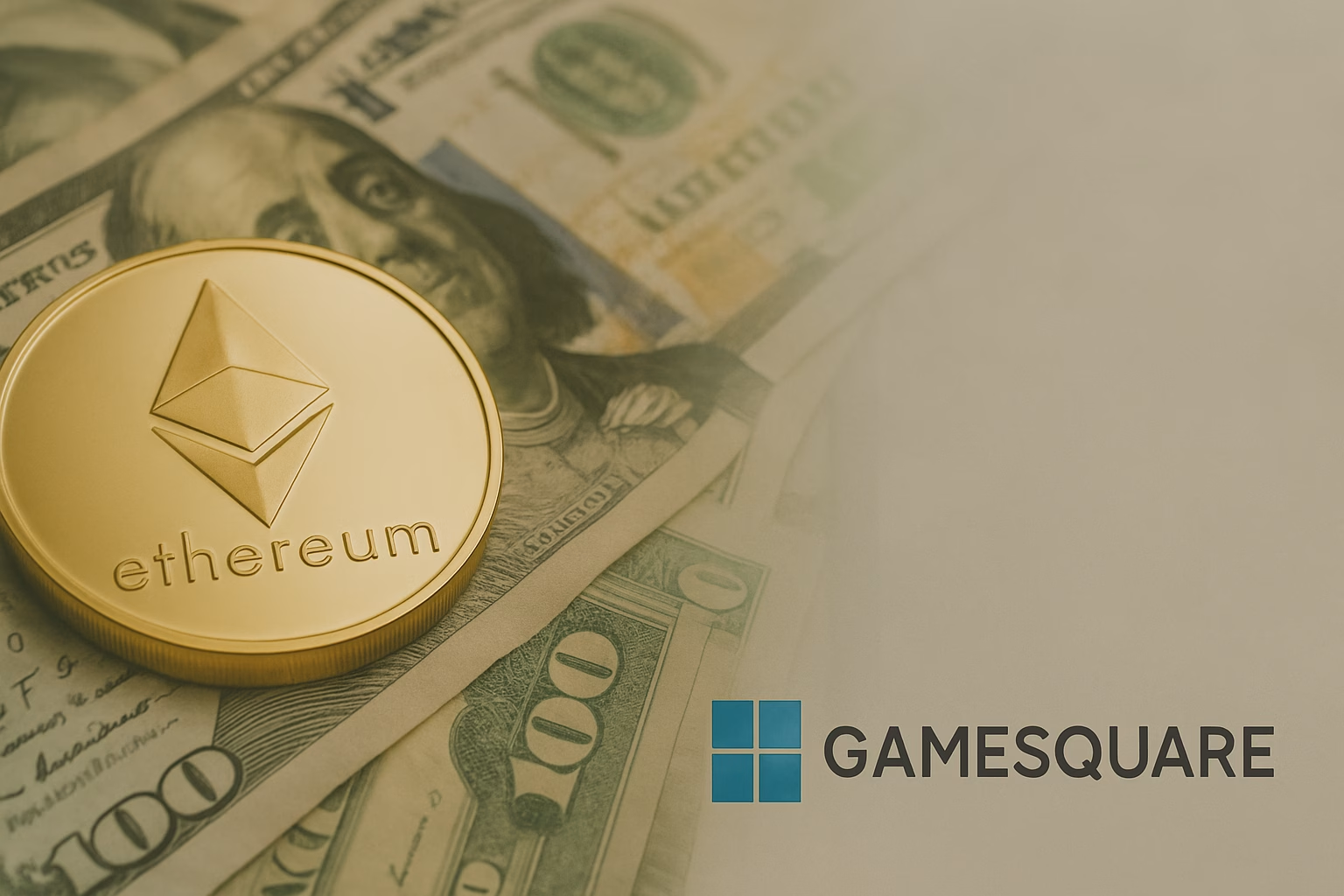Investment
Ether or Not: GameSquare’s $100M DeFi Play Raises Complex Legal Questions for Corporate Treasuries

Table of Contents
On 10 January 2025, GameSquare completed its first USD 5 million Ethereum purchase as part of its broader USD 100 million digital asset treasury strategy, according to an investor update. This initial acquisition “marks an inflection point in GameSquare’s strategic evolution” into decentralized finance (DeFi) and signals that implementation is already underway. GameSquare described the move as a step toward long-term diversification, aligning with its vision of embracing blockchain innovation.
GameSquare Holdings‘ $100 million Ethereum treasury strategy marks a pivotal moment at the intersection of traditional corporate finance and DeFi. The esports-focused media and entertainment company recently priced an underwritten public offering to fund this initiative, a bold move that could reshape how public companies manage digital assets. However, this ambitious plan raises numerous legal and regulatory considerations that extend far beyond typical investment considerations.
The Strategy: Go Big
Partnering with crypto investment firm Dialectic, GameSquare is using Dialectic’s Medici platform to pursue yield strategies targeting returns between 8–14%. This is far higher than the typical 3–4% from standard staking. The significantly higher targeted yields come from sophisticated DeFi strategies rather than basic ETH staking. These strategies could include lending and borrowing protocols, liquidity pool participation, yield farming, and automated arbitrage trading.
While potentially lucrative, these practices come with significant technical and legal risk. Hacks, smart contract flaws, and volatile markets could lead to substantial losses—risks that go beyond traditional treasury management. While these mechanisms offer the potential for enhanced returns, they also introduce a complex web of legal, regulatory, and operational risks that public companies must carefully navigate.
Regulatory Uncertainty: A Multi-Agency Maze
Perhaps the most significant legal challenge facing GameSquare is the unresolved regulatory landscape for cryptocurrency and DeFi activities. Unlike traditional financial instruments with clear regulatory oversight, DeFi operates in a jurisdictional gray area with multiple agencies asserting competing claims of authority.
The U.S. Securities and Exchange Commission (SEC) has designated cryptocurrencies as a key examination priority for 2025, while simultaneously the Commodity Futures Trading Commission (CFTC) is also vying for regulatory oversight responsibilities. Other federal and state regulators, including FinCEN and state money transmission agencies, may also have a say. Legislation like the FIT21 Act and the GENIUS Act seeks to clarify stablecoin rules and broader crypto oversight, but nothing is settled. This regulatory fragmentation creates substantial compliance challenges for public companies venturing into DeFi treasury strategies.
For GameSquare, this means navigating a complex web of potentially applicable regulations without clear guidance on which agency’s rules take precedence for specific DeFi activities.
Disclosure Duties
Despite unclear rules, public companies still have to meet disclosure requirements under federal securities law. The SEC expects issuers to explain the most significant investment risks, even when the risks stem from unclear or evolving regulations.
GameSquare must be transparent about smart contract vulnerabilities, custody concerns, and the speculative nature of DeFi strategies. That includes addressing things like:
- Code Vulnerabilities: Smart contracts can’t be changed once deployed, so bugs or exploits can’t easily be fixed. This makes any coding errors a serious financial risk.
- Operational Security Risks: Using third-party crypto custodians requires strong internal controls and cybersecurity safeguards. A failure in oversight could lead to asset loss or regulatory violations.
- Liquidity and Market Volatility: DeFi asset values can swing dramatically based on market activity and liquidity. Sudden shifts can result in losses or reduced access to funds.
Governance and Oversight
These risks raise questions about GameSquare’s internal controls and board oversight. Under corporate law, corporate directors hold fiduciary duties to understand and monitor new technologies. Although GameSquare seems to have vetted this move, ongoing education and vigilance will be crucial.
Audits and compliance processes must also evolve as rapidly as DeFi demands. Traditional audit and compliance models don’t always account for DeFi’s real-time, self-executing smart contracts or the legal ambiguity of many transactions.
Compliance Considerations
GameSquare must tread carefully to avoid running afoul of:
- Federal securities laws (unregistered securities offerings)
- Commodity regulations (particularly if derivatives are involved)
- State money transmission laws
- Foreign laws (in relevant jurisdictions)
To manage the legal and operational risks of its DeFi treasury strategy, GameSquare should adopt a multi-layered risk mitigation approach in concert with their partner Dialectic. This includes conducting regular third-party audits of smart contracts, closely monitoring regulatory developments at the federal and state levels, and exploring both decentralized and traditional insurance options to cover potential losses. Implementing strong governance structures—such as formal approval processes and position oversight—can help maintain compliance and accountability in a rapidly evolving legal landscape.
Industry and Market Impact
Depending on its success, GameSquare’s decision may encourage other public companies to consider DeFi for treasury operations amid growing adoption of digital assets. GameSquare’s DeFi experiment marks a new frontier in corporate finance, but its unfolding remains in a minefield of legal limbo. Until Congress or regulators provide greater clarity, other companies may be advised to sit back and watch as GameSquare serves as a test case.
As CEO Justin Kenna stated, the strategy reflects Gamesquare’s commitment “to executing a disciplined, forward-looking strategy.” But the company, like others eyeing similar moves, will need to remain nimble as laws and interpretations evolve.







